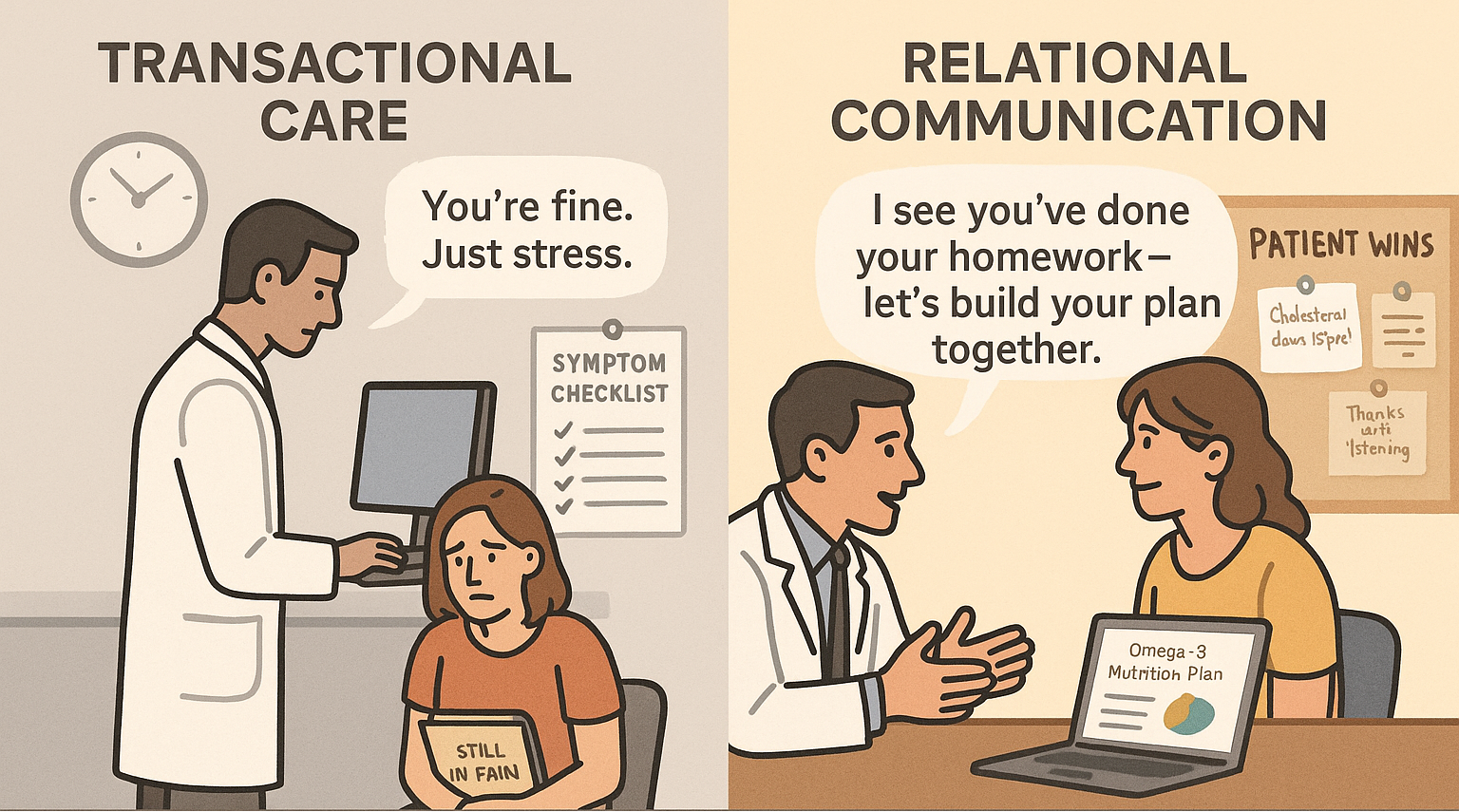It’s impossible to overstate the importance of relational communication in healthcare customer service if you want to boost patient retention, enrich patient experience, and improve clinical outcomes.
Emotional intelligence often takes a backseat to efficiency in today’s fast-paced healthcare environment, but you can break the mold and separate yourself from competitors by putting people before processes.
Relational Communication in Healthcare: More Than Just Good Bedside Manners
People who walk into medical offices are humans with fears, hopes, and questions. Relational communication in healthcare prioritizes empathy, mutual respect, and collaborative dialogue over symptom management.
Studies show that patients are 30% more likely to adhere to treatment plans when clinicians adopt patient-centered care techniques. In contrast, transactional communication, which is characterized by rushed visits and one-way instructions, often leaves patients feeling unheard and undervalued.
The Transactional Nature of U.S. Healthcare
The transactional healthcare system in the United States rewards volume over quality. The results include:
- Time-limited visits that last around 7 to 15 minutes, forcing providers to juggle charting and throughput over deep listening or patient education.
- Symptom-driven diagnostics, where anything outside a narrow algorithm is dismissed as “not relevant,” blamed on anxiety, or viewed as another healthcare provider’s problem.
- Burnout-induced detachment, where clinicians emotionally distance themselves to survive their high-workload, high-liability environment.
- Billing incentives that favor high volume and procedure-based care over preventative efforts and lengthy conversations educating patients.
- Dismissive language like “you’re fine” or “it’s just stress,” without exploring the “why.”
This approach might work for acute conditions, but people with chronic or complex health issues often fall through the gaps, leaving them struggling with symptoms for years or the rest of their lives. The growing spinal leak care market is a perfect example of this reality, as the number of patients with cerebrospinal fluid leaks rises due to factors like a high rate of misdiagnoses, as physicians dismiss symptoms and attribute them to other health issues like hormone imbalances or anxiety.
The Importance of Customer Service in Healthcare
Excellent customer service makes patients feel like their concerns are being addressed. Many clinics struggle to grow their patient base because they make patients feel like just another number.
Some of the reasons why physicians in private practice should prioritize relational communication include the fact that this approach to communication:
- Increases patient satisfaction: Responding to concerns with curiosity rather than dismissiveness increases satisfaction scores, leading to better patient reviews and increasing the odds of repeat visits.
- Patient engagement: Open two-way communication empowers patients to take ownership of their health.
- Patient retention: It costs more to attract a new patient than to keep an existing one. A relational approach turns one-offs into loyal advocates.
- Word-of-mouth referrals: How patients feel impacts retention and word-of-mouth referrals, not just procedures performed. Happy patients refer friends and family. That organic growth is gold for any healthcare marketing strategy.
Real-world impact
Imagine getting a newsletter titled “5 Ways to Improve Heart Health” from a physician who shrugged off your concerns about statins and prescribed the medication for you anyways, labeling your cholesterol numbers as your failure as a human and your concerns about the neurological impact of statins as non-compliance. It would feel hollow, and you’d most likely ignore newsletters like these.
Now, imagine a doctor who considered your concerns and followed up with an email saying, “I see you’ve done your homework on Omega-3s—great job! Let’s partner with a dietitian to explore nutritional plans and monitor your lipids together.”
That’s relational communication. You’ve validated the patient’s effort, opened up two-way communication, and set the stage for better adherence. Not only will your patients open your next email newsletter, they’re more likely to show up for follow-up visits and tell everyone they know about you.
Concierge and direct-care models promise to pay more attention to patients, but many replicate transactional habits formed during hospital work. A premium fee can’t buy genuine connections with active listening and emotional attunement.
How to Adopt Relational Communication in Private Practice
You don’t need to overhaul your entire practice to start providing better customer service. Start small:
- Train your team: Role-play common scenarios so team members can practice relational communication.
- Add buffer blocks: Add five-minute buffer slots to your calendar to give yourself time to destress between appointments.
- Embrace patient communication tools: Platforms like SimplePractice or Medallia allow you to automate follow-ups and satisfaction surveys.
- Measure what matters: Track vital metrics like Net Promoter Score (NPS) and clinical key performance indicators (KPIs).
- Celebrate successes: Share patient shout-outs during staff meetings to reinforce good relational behaviors.
Ready to Transform Your Patient Relationships?
Practicing relational communication in the healthcare field gives you a competitive edge. Treating customer service as a core clinical skill leads to happier patients, increased retention, and better word-of-mouth marketing.
Want more insights on ways to improve patient experience and boost retention? Subscribe to our email newsletter for regular tips, case studies, and exclusive resources.
Patients come back, refer others, and return to your clinic when you make them feel seen, heard, and included. They don’t call around looking for second, third, or fourth opinions. They trust your expertise.


.png?width=352&name=Medical%20Marketing%20Blog%20(3).png)

.png?width=352&name=Medical%20Marketing%20Blog%20(1).png)